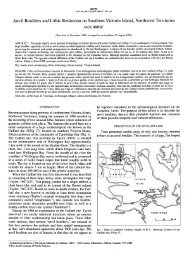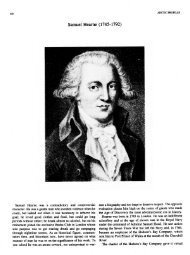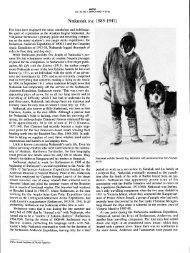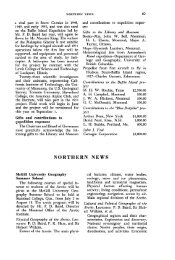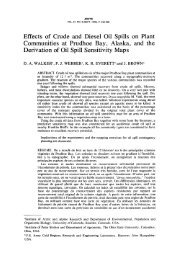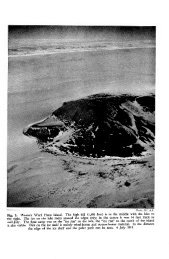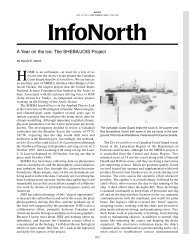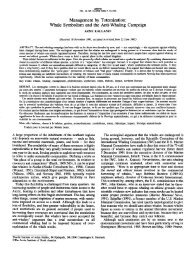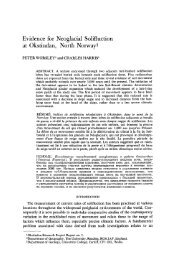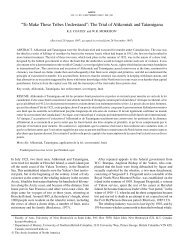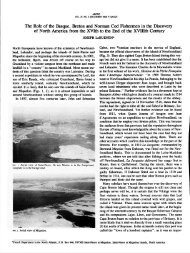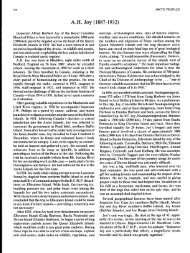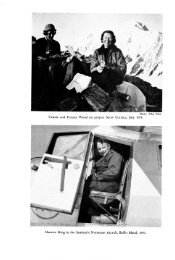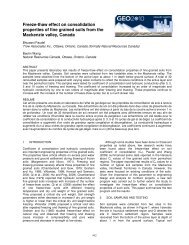William Scoresby Senior (1760-1829)
William Scoresby Senior (1760-1829)
William Scoresby Senior (1760-1829)
Create successful ePaper yourself
Turn your PDF publications into a flip-book with our unique Google optimized e-Paper software.
ARCTIC<br />
VOL. 35, NO. 4 (DECEMBER 1982) P. 548-559<br />
<strong>William</strong> <strong>Scoresby</strong> <strong>Senior</strong> (<strong>1760</strong>-<strong>1829</strong>)<br />
Courtesy of Caedmon of Whitby Press
ARCTIC PROFILES<br />
Not least among this man’s achievements was being the Those who did not know Captain <strong>Scoresby</strong> well thought<br />
father of <strong>William</strong> <strong>Scoresby</strong> F.R.S. But one is led to won- him eccentric, but his son tells us it was actually his<br />
der what he himself might have accomplished had he been<br />
given the apportunities he later gave to his son.<br />
He was of an original and inventive turn of mind, and the<br />
actions, based on reflective, philosophical consideration,<br />
that made him appear so. Take, for example, his method of<br />
freeing the ship from ice-bound conditions by “sallying”.<br />
shelter given to the masthead lookout by the “crows’ He directed the whole crew to run alternately from side to<br />
nest” is his creation. Before this semi-barrel was hoisted side of the ship, causing it to rock gently and thus loosen<br />
aloft, with shelf and seat and windproof hood, the lookout<br />
man - often the captain himself - had to be content with<br />
an inadequate piece of canvas for shelter. In storm-tossed,<br />
ice-capped waters, the man on the mast sometimes had<br />
spells of eight hours and more perched aloft, and he would<br />
have good reason to thank <strong>William</strong> <strong>Scoresby</strong> for his<br />
invention.<br />
its position, enabling it to be eventually freed. He was a<br />
fearless man and did not hesitate to risk even his young<br />
son’s life by sending him over very thin ice, which would<br />
not bear a grown man’s weight, to harpoon a whale. According<br />
to legend, he could subdue a polar bear by merely<br />
looking him in the eye. In fact, the animal was one he had<br />
brought to Whitby as a cub; nevertheless, it was a bold act<br />
Born near Whitby, England into a farming community, to put his hand between the bars and stroke the fully grown<br />
he ended his formal schooling around the age of nine. animal in later years.<br />
Being dissatisfied with an agricultural life, he determined In these conservation-conscious days, it might be thought<br />
to go to sea and set himself the task of learning navigation out of place to say that Captain <strong>Scoresby</strong> brought more<br />
and astronomy. His early voyages took him to places as whales back to Whitby than did any other skipper. Yet it is<br />
far away as St. Peterburg and Spain, where he was cap- well to remember that England was greatly dependent on<br />
tured and managed to escape through stratagem. He joined whale products for many things, not least of which was<br />
a Whitby whaling vessel when he was 25, and from then on lighting, for gas was in its infancy, and so was Michael<br />
he found ample opportunity for developing his skills. Faraday.<br />
He was a powerfully built man, and one of keen intellig- The achievements of <strong>William</strong> <strong>Scoresby</strong> <strong>Senior</strong> and his<br />
ence. Studying each job to be done, he soon worked out son form an unrivalled chapter in the history of the Arctic,<br />
the quickest and most efficient way of doing it. One exam- for indubitably the formative years of <strong>Scoresby</strong> junior<br />
ple involved the flensing of whales. Not long after he had were largely shaped by the leadership of his father who,<br />
been given command of a whaler, he challenged four men<br />
busy at the job, saying he could do it single-handedly in<br />
though lacking formal education and sophistication, was<br />
yet an original and forceful character, seeing in the Arctic<br />
half the time. They were crestfallen when he accomplished opportunities for exploration and investigation far exceedit<br />
in one-third of the time. In ice navigation he possessed ing the commercial endeavours which were his main object.<br />
that extra sense also attributed to Captain Cook. It seemed His son brilliantly continued and greatly enlarged his fathas<br />
if he knew what was over the horizon, and he safely led er’s early ambition. That the father’s example and training<br />
every ship under his command into calm waters heavily won his son for arctic science cannot be doubted.<br />
populated with whales.<br />
But hunting whales was not the sum total of his sailing<br />
FURTHER READINGS<br />
life. He had an inquiring mind and was early led to report SCORESBY, WILLIAM, Sr. 1981. The 1806 Log Book of <strong>William</strong><br />
on arctic winds, currents, and ice conditions to Sir Joseph<br />
Banks, who voyaged with Captain Cook.<br />
In 1806 he forced his ship, the Resolution, through the<br />
Spitsbergen ice barrier into open water in the far north.<br />
They reached an estimated 81’30’ N latitude and could<br />
have sailed even farther, had it not been for the commer-<br />
-.<br />
<strong>Scoresby</strong>. Facsimile reprint, Whitby: Caedmon of Whitby Press.<br />
1917. Seven Log-Books Concerning the Arctic Voyages of Capcial<br />
design of the voyage and the scarcity of whales. Even<br />
Tom and Cordelia Stamp<br />
so, the <strong>Scoresby</strong>s (his son was with him as mate) held the<br />
9 John Street<br />
record for sailing farthest north for nearly a century, if one<br />
Whitby, North Yorkshire<br />
discounts sledging journeys.<br />
YO21 3ET England<br />
tain <strong>William</strong> <strong>Scoresby</strong>, <strong>Senior</strong>. Facsimile reprint, New York: The<br />
Explorers Club.<br />
SCORESBY, WILLIAM, Jr. 1978. My Father. Reprinted Whitby: Caed-<br />
mon of Whitby Press. (Originally pub. 1851).<br />
549



